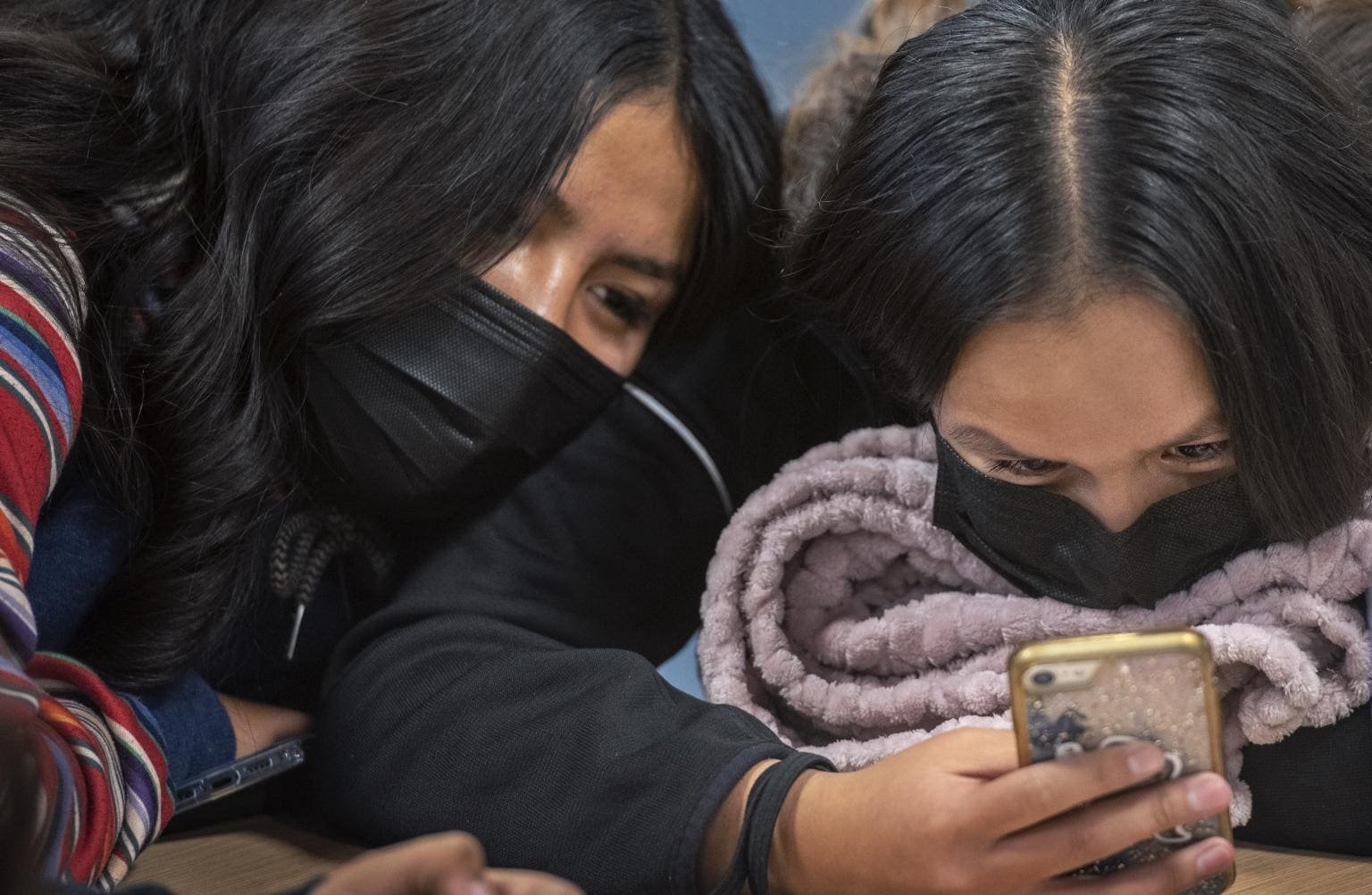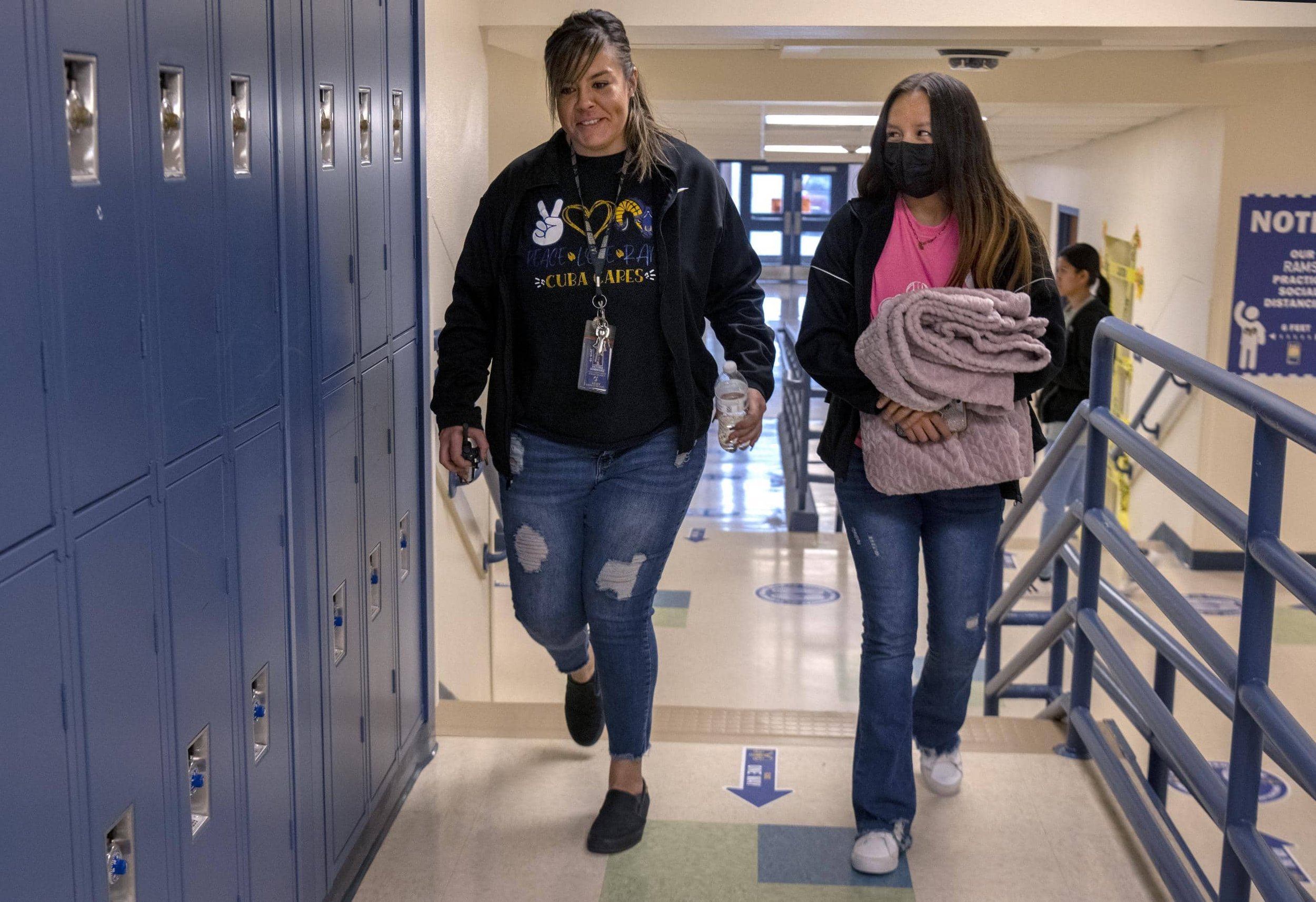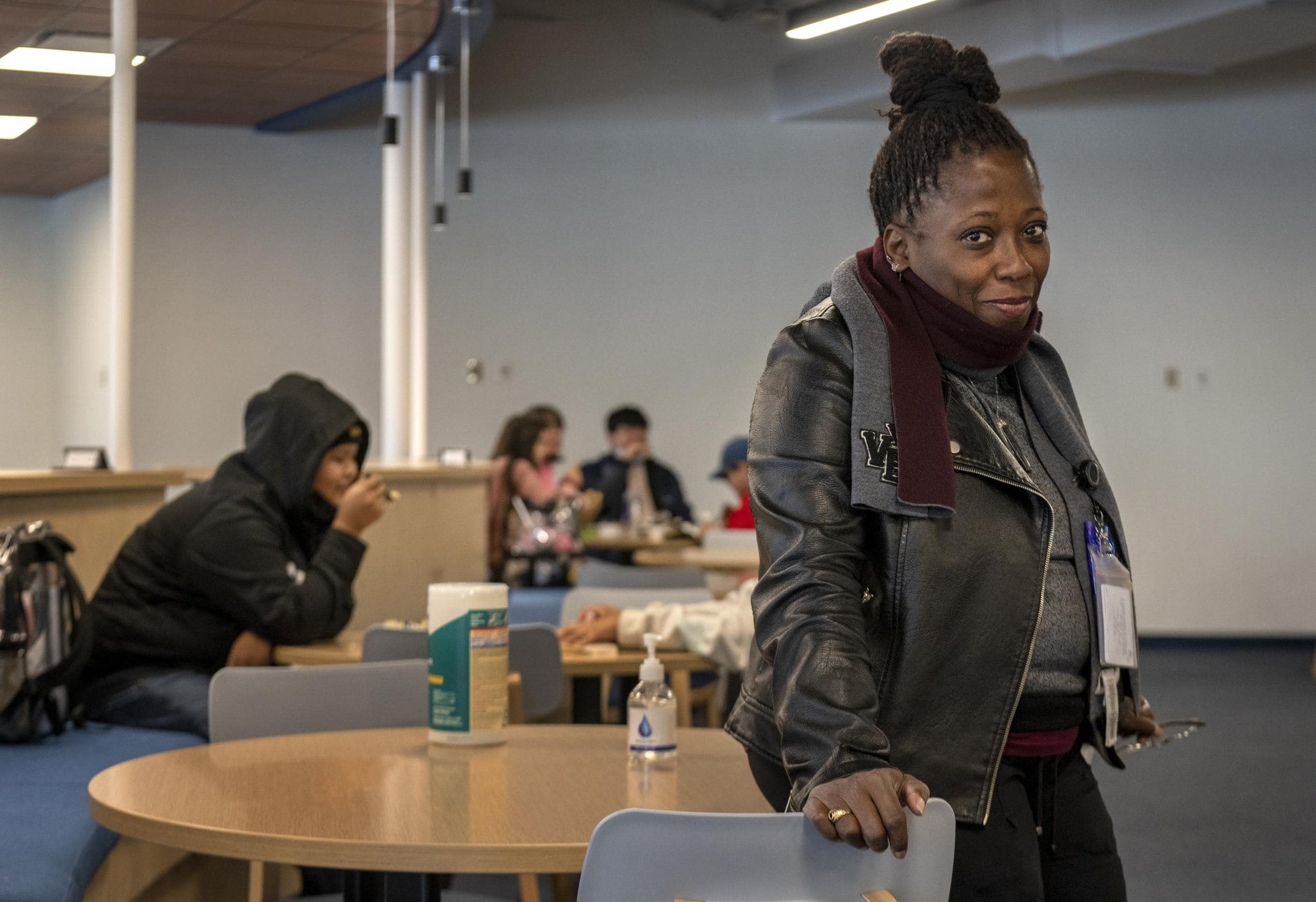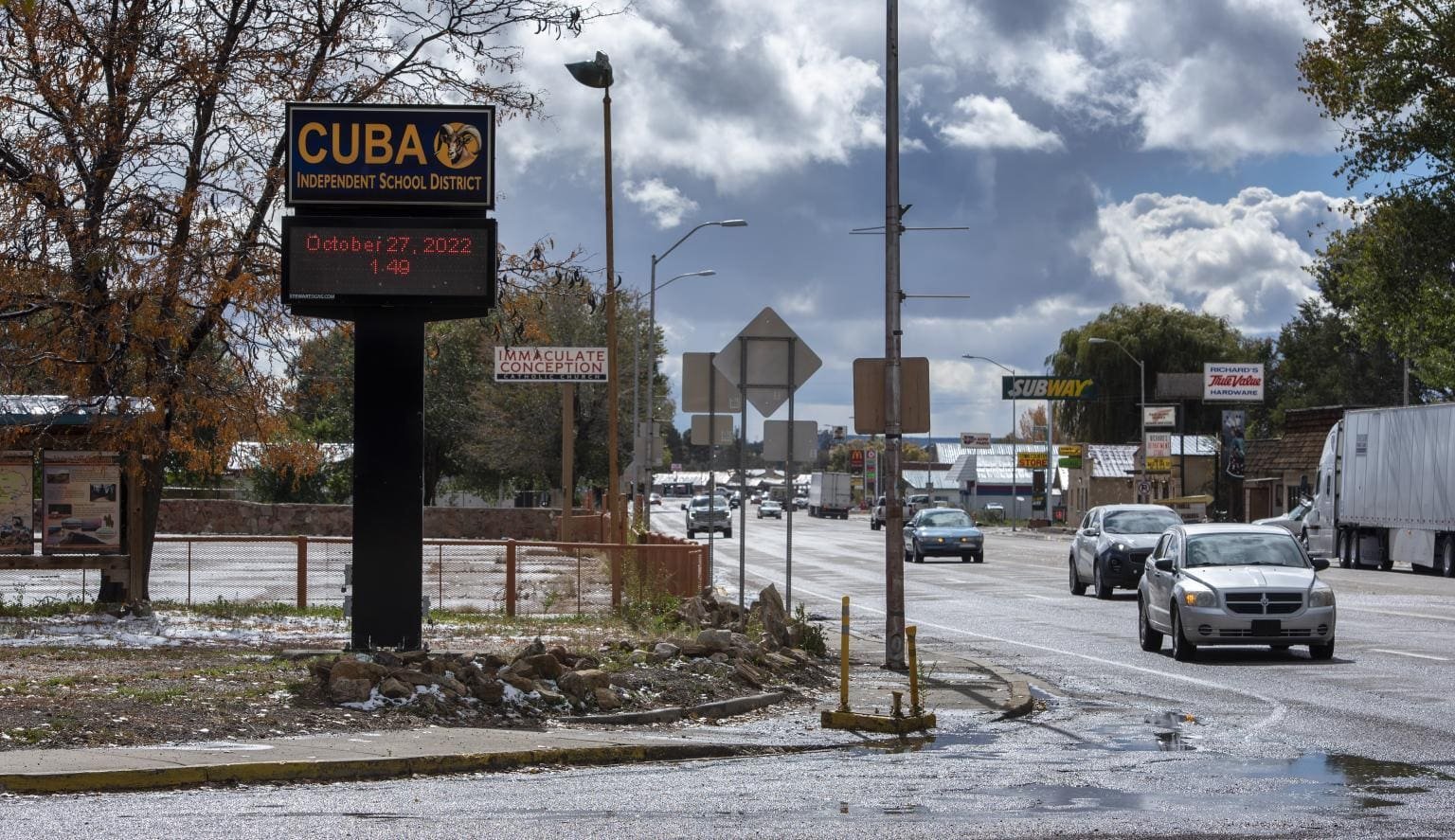Shilayia Antonio, 16, looks at her phone with her friend, Shanaeya Thomas, left, in the media area of Cuba High School on Thursday. Antonio, a student who in the 2020-21 school year was experiencing housing instability, was among 53 students who participated in a pilot program giving conditional money for basic needs. (Eddie Moore/Albuquerque Journal)
Mya Meredith, a junior at Cuba High School, had a harder freshman year than most.
For some time that year, she lived in a domestic violence shelter with her family, and there were times they had trouble paying bills and getting basic necessities like clothes and hygiene products.
“We were struggling for a while and we were just kind of stuck,” she said. “With school, I was really falling behind.”
They’d soon find out they weren’t alone in their challenges.
Meredith participated in a pilot program giving $500 every month to 53 high school students who were homeless or experiencing some form of housing insecurity. The program was run by New Mexico Appleseed, a foundation dedicated to tackling poverty in the state.
The pilot was funded by the Los Alamos National Laboratory Foundation which, according to an Appleseed report about the program, gave about $120,000 each to Cuba Independent School District and West Las Vegas School District to cover tutoring, family stipends, and costs for district staff.
Community Schools and Cuba CARES Director Victoria Dominguez, left, walks down the hallways of Cuba High School with junior Shilayia Antonio on Thursday. Antonio was among several Cuba students to receive monthly stipends to help with basic needs during the 2020-21 school year. (Eddie Moore/Albuquerque Journal)
“We really wanted to target those populations that we felt were suffering the most during the pandemic,” LANL Foundation President and CEO Jenny Parks said.
Through the program, which ran about eight months in the 2020-21 school year, Meredith said she and her family were able to pay for their basic needs, which helped lift a burden from her and her mother.
Meredith has since left the shelter and now lives in the Ojo Encino chapter of the Navajo Nation. On top of the help she received to buy basic necessities, the program also helped her catch up in school.
That, in turn, had an ongoing positive effect, helping her academically in the years since the program ended.
“I really caught up with my math, because that was one of the subjects that I was really struggling in,” she said. “It just helped me catch up a lot.”
Ethical questions
The program attached several conditions to the cash. Those included requiring students to attend school 90% of the time and complete the same percentage of their class work, and requiring them to meet every week for check-ins and tutoring sessions.
Appleseed Founder Jenny Ramo said she and her team agonized over the ethics of holding students and their families to those conditions.
“The ethics really weighed heavily on me, because people deserve to have their basic needs met, no matter what, period. They deserve housing, food, access to health care,” she said. “And so to add a condition to getting your basic needs met is problematic.”
Donnica Dunlap, a McKinney-Vento homeless assistance liaison at Cuba Independent School District, stands in the media center of Cuba High School on Thursday. (Eddie Moore/Albuquerque Journal)
At the end of the day, she said students seemed to benefit from going to school, tutoring and emotional support, and having the money tied to participation in those things was the “least problematic” solution.
Students and their families all figured the conditions were fair as well.
Shilayia Antonio, another junior at Cuba High School, said she and her older sister both saw their grades soar back from failing as a result of their tutoring sessions – a recovery she said has stood the test of time, even after the program ended.
“It was a really big help,” she said.
And that was just the cherry on top of the cake of being able to pay for school supplies, clothes, utilities, rent and car payments with the monthly checks.
Continued support
The pilot brought a lot of good to students and their families.
According to a report about the program by Appleseed, all but one of the participating seniors graduated on time that year – though the foundation noted that outcome could not be attributed to the pilot alone.
They did say that students almost universally saw their grades improve by the end of the program and benefited from peace of mind from having their basic needs better-taken care of.
But for all the good that the pilot program brought, it only ran during that one school year, and school staff, students and families just about universally said they wished it would have continued.
“I really think that it was a working program, because it allowed the kids to not have to worry about adult situations,” West Las Vegas School District Superintendent Christopher Gutierrez said. “This program gave them a glimpse of light at the end of the tunnel to where they could be kids and focus on them and what they need to do to maybe, eventually, get out there and be their own adults someday.”
Cuba High School, home to just shy of 300 students, serves largely rural communities. Most students who attend Cuba Independent School District schools are Indigenous, the district superintendent says. (Eddie Moore/Albuquerque Journal)
And while students and their families were helped by the program, that doesn’t mean their struggles ended with the pilot.
School staff, including teachers, are still working with many of the students originally involved in the pilot – some of whom are still considered “at risk” and are experiencing housing instability.
“After this program, honestly, they don’t have the money, right?” Cuba High School math teacher Mary Ann Ga said. “After the program, they don’t have a house to live (in), and it breaks my heart.
“I hope this program will be continuous so that we can house the students and help them to survive.”
Both Ramo and Parks agree. Still, on top of the fact that Parks said the program was “expensive” and couldn’t be continued, both pointed out that it was originally intended as a pilot.
Nevertheless, Ramo said Appleseed found that the pilot was able to show that providing conditional cash to students in need did help their academic outcomes.
“In general, people are not blowing it on things that don’t matter. They’re not blowing it on drugs, they’re not blowing it on alcohol,” Ramo said. “They really do just become better parents and better kids and less stressed when they have their basic needs met.”
Ramo said she plans to make an appeal to New Mexico lawmakers in the coming years to implement and fund similar programs at a statewide level.
“We are hoping the Legislature steps in, maybe for next year, and really puts aside money for cash transfers,” she said. “We would recommend the homeless population, inadequately housed population, because they are the most vulnerable of the vulnerable, and they’re the most likely to succeed with financial help.”




